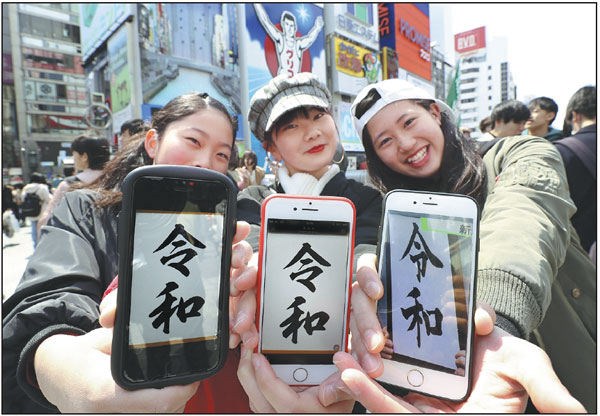New name unveiled to end Japan's Heisei Era
As Japan's three-decade-old Heisei Era marks its final steps and a new emperor prepares to ascend the Chrysanthemum Throne, Tokyo announced a new name on Monday to be used starting on May 1 to mark the change.
"The new era name will be Reiwa," said Japan's Chief Cabinet Secretary Yoshihide Suga at a news conference on Monday after unveiling the gengo - the name of an era in Japanese - that was written in calligraphy on rice paper with ink and brush and displayed.
Every emperor in Japan has his own gengo, which typically comprises two characters, or kanji in Japanese, a writing system that has its roots in China.
Normally the gengo is used during the length of an emperor's reign and has a positive meaning that represents the values and ideals of the people.
The new era name's Rei is most often used to mean "command" but can also mean "good" and "beautiful", and Wa can be translated as "peace" or "harmony".
According to Suga, the new era name came from a line of a poem in Manyoshu, the oldest collection of Japanese poetry. Roughly, it means, "When early spring comes, the good fortune moon also comes out, making the air and the breeze gentle and refreshing."
"I hope the era name will be widely accepted by the people and deeply rooted as part of their daily lives," Suga said.
Japanese Prime Minister Shinzo Abe further explained the name after Suga's announcement, saying the poem, which refers to blooming plum blossoms, reflects "Japan's unique national identity, such as its everlasting history, its fragrant culture and four seasons that bring beautiful nature, and firmly hands them down to the next generation".
Abe said the government chose the name Reiwa "with hopes of making Japan a nation where every person can achieve dreams, like the plum flowers that bloom beautifully after the severe winter to signal the start of the spring".
Reiwa is the 248th gengo in Japanese history and the first one not from Chinese classics. It will take effect on the day Crown Prince Naruhito accedes to the throne after his father, Emperor Akihito, abdicates on April 30.
Daichi Baba, who was born in 1989, the first year of Heisei, said the new era's name makes him think about Japan's role in global society.
"This Japanese gengo was not chosen from Chinese classics for the first time," Baba said. "I think it is to emphasize Japan's own role in a globalized society, and as a Japanese, I would like to build a 'harmonious' society that respects each other's culture and spirit regardless of nationality or race."
Kouta Odajima, in his 40s, who came from Ibaraki prefecture, said he hopes the incoming Reiwa will really bring good fortune to people and erase the feeling of loss associated with Heisei. "Many people's memory of Heisei is of stagnation and economic losses. I hope that will undergo a 100 percent change in the new era."
wangxu@chinadaily.com.cn
|
Women in Osaka, Japan, show smartphone screens that display "Reiwa", the name of Japan's new era, which begins on May 1, after the name was announced by the government on Monday. Kyodo News Via Getty Images |
(China Daily 04/02/2019 page1)



















